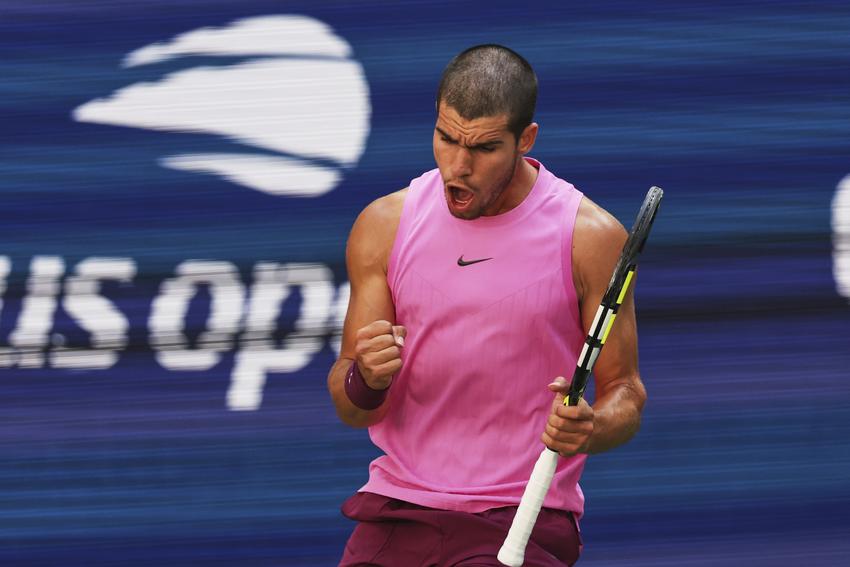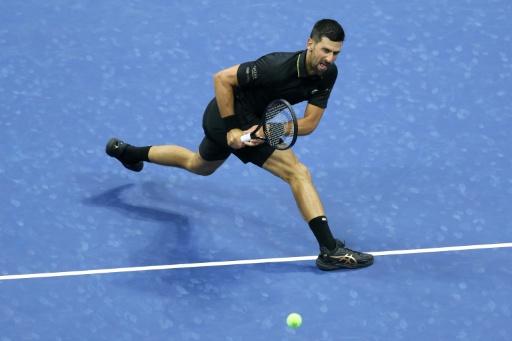
Carlos Alcaraz hit a behind-the-back shot at the U.S. Open to win a point in a 7-6 (3), 6-3, 6-4 victory over Arthur Rinderknech on Sunday that made the Spaniard the youngest man in the Open era to reach 13 Grand Slam quarterfinals.
“Sometimes, I practice it. I’m not going to lie,” the No. 2-seeded Alcaraz said about the bit of wizardry he delivered in the first set. “But I mean, I don’t practice it, like, too many times. Just in practice, if the opportunity is there, I will try. In the match, it’s kind of the same. If I have the opportunity, why not?”
At 22 years and 3 months old, Alcaraz is about 6 months younger than Boris Becker was when he got to major quarterfinal No. 13.
Alcaraz’s opponent on Tuesday will be No. 20 Jiri Lehecka, a 23-year-old from the Czech Republic. Lehecka advanced to his second Slam quarterfinal with a 7-6 (4), 6-4, 2-6, 6-2 win over Adrian Mannarino.
Early on against Rinderknech, a Frenchman who played college tennis at Texas A&M, Alcaraz closed a love hold that made the score 2-all in spectacular fashion. Moving to his right at midcourt, Alcaraz found himself in what appeared to be a bad spot when Rinderknech wrong-footed him.
But Alcaraz wrapped his racket around his body and flicked a shot up the line ( see it here ).
Perhaps startled that the point wasn’t over, Rinderknech hit a volley that landed in the net. A big smile crossed Alcaraz’s face as he looked over at his coach, Juan Carlos Ferrero, in the stands. Alcaraz then placed his right index finger behind his ear, as if acknowledging the spectators’ cheers.
“The people like it; I like playing tennis like this,” Alcaraz said. “My style of tennis fits pretty well to the energy here.”
Alcaraz wound up taking that set in a tiebreaker. Then, midway through the second, Alcaraz produced another highlight-worthy effort with a no-look passing winner, racing forward to get to a short ball and glancing down the line as though he was going to hit to Rinderknech’s backhand, but instead steering a forehand cross-court.
By the last game, even Rinderknech was smiling at other next-level strokes by Alcaraz, who has won 54 of 55 service games through four matches this year at Flushing Meadows. He claimed the title here in 2022 for the first of his five Grand Slam trophies.
Alcaraz is into his fourth major quarterfinal of 2025, the first time in his career he’s gone 4 for 4 in that category in a season. He lost to Novak Djokovic at that stage at the Australian Open in January, won the French Open in June and lost to No. 1 Jannik Sinner in the final at Wimbledon in July.
In women’s action, Taylor Townsend couldn’t covert eight match points in a second set that ended with a 25-minute tiebreaker and was eliminated with a 1-6, 7-6 (13), 6-3 loss to Barbora Krejcikova.
With fans chanting “Let’s go Taylor! Let’s go Taylor!” for a player who became a fan favorite during the tournament after her confrontation with Jelena Ostapenko following her second-round victory, Townsend was repeatedly a point away from what would have been her first Grand Slam quarterfinal.
No. 4 seed Jessica Pegula irolled into the last eight by routing fellow American Ann Li 6-1, 6-2 in just 54 minutes and will face Krejcikova. (JapanToday)

